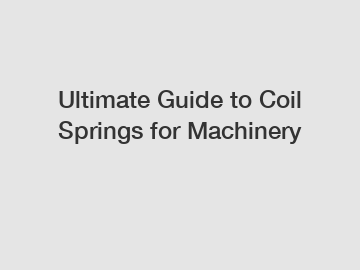Ultimate Guide to Coil Springs for Machinery
Coil springs are a critical component in a wide range of machinery, from cars to heavy industrial equipment. These springs are designed to absorb and store energy when a force is applied to them, and then release that energy when the force is removed. They are used to provide suspension in cars, support loads in industrial machinery, and maintain tension in various mechanical systems.
Understanding the importance of coil springs in machinery is essential for anyone involved in the design, maintenance, or operation of these systems. In this ultimate guide, we will explore the different types of coil springs, their uses in machinery, and best practices for ensuring their longevity and performance.
Types of Coil Springs.

There are several types of coil springs commonly used in machinery:
1. Compression Springs: These are the most common type of coil springs and are designed to absorb and store energy when compressed. They are often used in suspension systems, shock absorbers, and other applications where a component needs to return to its original position after being compressed.
2. Extension Springs: These springs are designed to absorb and store energy when stretched. They are commonly used in garage doors, trampolines, and other applications where a component needs to return to its original position after being extended.
3. Torsion Springs: These springs are designed to absorb and store energy when twisted. They are often used in door hinges, clock mechanisms, and other applications where a component needs to return to its original position after being twisted.
4. Constant Force Springs: These springs are designed to provide a constant force over their entire range of motion. They are often used in retractable tape measures, window shades, and other applications where a constant force is required.
Uses of Coil Springs in Machinery.
Coil springs are used in a wide range of machinery for various purposes:
1. Suspension Systems: Coil springs are commonly used in vehicle suspension systems to absorb shocks and provide a smooth ride. They help to maintain traction and stability, especially when driving over rough terrain.
2. Industrial Machinery: Coil springs are used in industrial machinery to support heavy loads, provide cushioning, and maintain tension in various mechanical systems. They are often found in presses, conveyor systems, and other equipment where precision and reliability are critical.
3. Clocks and Watches: Coil springs are used in clock and watch mechanisms to provide the necessary tension to keep the gears moving smoothly. They help to regulate the speed and accuracy of timekeeping devices.
Best Practices for Coil Springs.
To ensure the longevity and performance of coil springs in machinery, it is essential to follow these best practices:
1. Regular Maintenance: Inspect coil springs regularly for signs of wear, corrosion, or fatigue. Replace any springs that show signs of damage to prevent failure and costly repairs.
2. Proper Installation: Install coil springs according to the manufacturer's guidelines to ensure proper alignment and fit. Improper installation can lead to premature failure and decreased performance.
3. Correct Size and Type: Use the correct size and type of coil spring for the specific application. Using the wrong spring can lead to inefficiency, instability, and potential safety hazards.
4. Temperature and Environment: Consider the operating temperature and environment when selecting coil springs for machinery. Extreme temperatures, chemicals, and exposure to the elements can affect the performance and lifespan of the springs.
In conclusion, coil springs are a crucial component in machinery, providing support, tension, and energy absorption in a wide range of applications. Understanding the different types of coil springs, their uses, and best practices for maintenance is essential for ensuring the longevity and performance of these critical components. By following these guidelines, you can maximize the efficiency and reliability of your machinery while minimizing the risk of costly repairs and downtime.
Are you interested in learning more about Coil Spring Suspension Parts Price, Heavy-duty tension springs for oil and gas applications, Automotive coil springs for suspension systems? Contact us today to secure an expert consultation!

Comments
0